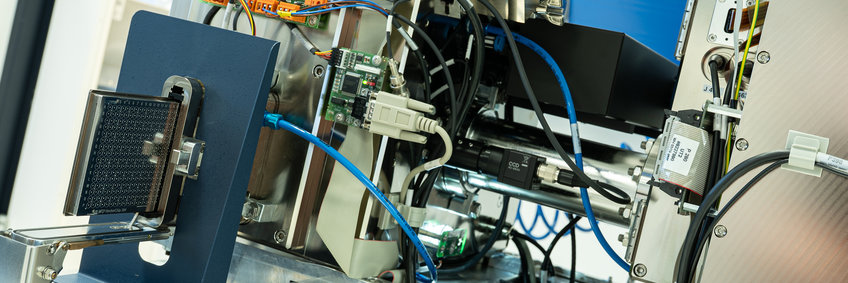
Neuroproteomics
Our mission: With its long-standing expertise in molecular neurosciences and mass spectrometry, the Neuroproteomics Group supports MPI-NAT researchers mainly working in the fields of neuron and glia biology. We also closely collaborate with the local University Medical Center Göttingen on the application of proteomic approaches to improve our molecular understanding of neuropsychiatric diseases (see Translational Neuroproteomics), and we are part of the Göttingen Proteomics Forum, a local scientific network of researches with a common interest in Omics technologies. Our ‘proteomic phenotyping’ workflow aims at providing mechanistic insights into the biology and pathology of mouse models with neurological and psychiatric relevance, thereby complementing other phenotyping approaches such as imaging or electrophysiology. The main application fields include the synapse and the myelin sheath as key elements of the nervous system.
What we provide: Our approaches include screening of protein interactors, charting of subcellular protein fractions, and quantitative profiling of entire proteomes. To address these complex questions and in line with the demands for routine ‘proteomic phenotyping’ of mouse models, we have developed a technology platform based on automated sample preparation protocols, mass spectrometric protein quantification, and customized data analysis pipelines. Specifically, we apply gel-based or filter-aided sample preparation (FASP) for in-gel or in-solution proteolytic digestion of protein fractions and ion mobility-enhanced data-independent acquisition (DIA) mass spectrometry for label-free protein quantification. As to instrumentation, a Tecan Freedom Evo 150 liquid handling workstation and two Waters Synapt G2-S/Si Q-TOF mass spectrometers are used for these purposes.
More sophisticated approaches using an Orbitrap-type mass spectrometer (Thermo Orbitrap Exploris 480), such as the characterization of ubiquitin-like protein modifications and low-input proteomics are in development, and potential collaborations in this context thus require special arrangements.
Apart from our proteomic work, we have a long history in the design and synthesis of functionalized peptides to be used as peptidic tools in application fields as diverse as interaction analysis, imaging, and peptide pharmacology. Methods for the quality control of synthetic peptides and synthetic oligonucleotides (not synthesized in our lab) by mass spectrometry are established on a Waters QDa single-Q mass spectrometer and a Bruker UltrafleXtreme MALDI-TOF mass spectrometer.
How we operate: On a collaborative basis, we support neuroscientific projects in all phases, from experimental design over sample preparation and data acquisition to data analysis and manuscript preparation. Due to the complexity of automated sample preparation workflows and the challenges of operating modern mass spectrometers, we typically do not provide direct access to our instrumentation.

